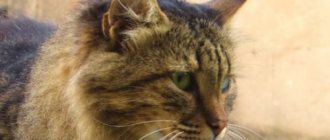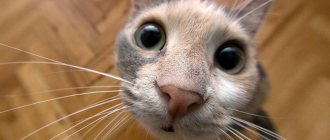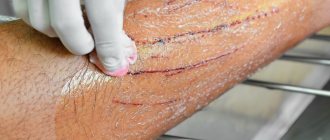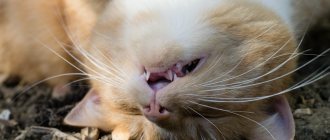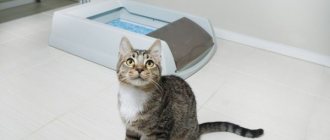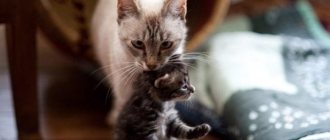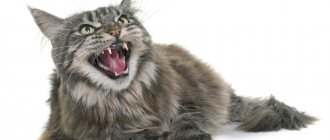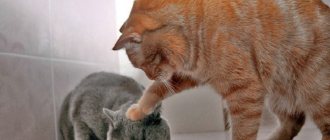It’s nice to communicate and play with cats: they are affectionate, fluffy, they like to bask in a person’s arms, purring... But sometimes our pets disturb us by making sounds that are not entirely “understandable”. Sometimes animals cough, sneeze, and sniffle. But all this is understandable. The cat could have caught a cold, or there might have been debris in his nose. But what if the cat grunts when breathing? Agree, it’s much more common to hear such sounds from a piglet, but not at all from your favorite furry “beast.”
Why this can happen: natural predisposition
If you are the owner of an “English” or a Persian cat, then you will most likely have to come to terms with his “oddities”. The fact is that animals of these breeds belong to the so-called brachycephalic varieties. This is the “scientific” name for mammals that have a shortened head with a characteristic “flat” muzzle.
In the process of breeding such animals, breeders encountered a lot of difficulties. So, the same Persians have a lot of genetic anomalies, many of which are tied to the genome, which provides these animals with a shortened full face of the skull. Whatever one may say, from a natural point of view such a structure is nonsense. In particular, all cats of these varieties are extremely unstable to the effects of very high and low temperatures: the air simply does not have time to warm up or, on the contrary, cool down in their nasal cavity.
In winter, Persians, Britons and cats similar to them constantly catch colds (they should not be allowed outside at all when the ambient temperature drops below 10° Celsius). In the summer, it’s hard and difficult for them to breathe in the heat - hence the “grunting”. Because of this, your pet regularly sneezes when he gets into a dusty room: his respiratory organs simply do not have time to filter everything. But there may be more to it than that.
The problem also lies in the structure of the soft tissues of their palate. Over time, especially in old pets, it can simply “sag,” thereby blocking the normal flow of air. Because of this, the animal becomes even more like a pig. In principle, there is no particular problem here, but... if the grunting becomes incessant, and your cat cannot sleep normally due to “heroic” snoring, we strongly advise you to take him to the veterinarian. It is quite possible that he will need surgery to correct the structure of the soft palate. During the intervention, the surgeon will cut off the “extra” parts that interfere with the normal passage of air. Another sign that “clearly hints” at the need for such a procedure is vomiting, which occurs with particularly strong “grunting”. But there are other causes of grunting breathing, many of which are not so “harmless”.
Herniated discs
Perhaps this is one of the most unpleasant and serious diseases of the spine that specialists have to deal with in their practice. What is an intervertebral disc? This is a “shock-absorbing cushion” located between the vertebrae. Each disc consists of an outer, rough and fibrous part, as well as a delicate central core, which in consistency is vaguely reminiscent of toothpaste.
Intervertebral discs connect the spine into a single unit and allow it to be flexible. In addition, they also absorb mechanical stress to which the spinal column is constantly exposed. When the outer shell of the disc becomes thinner for some reason, its internal contents begin to protrude into the spinal canal, pinching the spinal cord or, at best, its individual roots. This is an extremely dangerous process, since the cat can remain completely paralyzed at any moment without much chance of correcting the situation.
"Parasitic" problems
It is known that finding a cat that has not had helminths in its life is a task that is almost impossible in practice. It is extremely easy to “pick up” a parasite for a cat - he does not wash his paws with soap. On the contrary, our clean pets constantly lick their fur, to which anything can stick. For example, parasite eggs. Professional veterinarians generally recommend treating their pets with antiparasitic agents at least once a quarter, since otherwise problems cannot be avoided. Moreover, this must be done at intervals of two weeks...
Treatment of rhinitis
A runny nose and inflammation of the mucous membrane should be treated promptly
, there is no need to wait for complications for your pet to become deaf or for inflammation to spread to other respiratory organs.
- If rhinitis occurs due to an infection, bacterial or viral, the veterinarian prescribes antibiotics and antibacterial drugs, taking into account the animal’s age and breed. It is important to strictly adhere to the instructions and carry out the course of treatment to the end, even if there is no discharge and the nose can breathe freely.
- The course of treatment for rhinitis may include antipyretic, anti-inflammatory, and sedative drugs.
- Sometimes the veterinarian recommends rinsing the animal’s nose to ease its breathing and general condition.
- Inhalations with essential oils are effective for rhinitis; you just need to strictly follow the dosage of oil drops. The nose is also warmed up with warm sand or salt wrapped in a clean cloth.
- If your pet has dry skin around its nose, you can constantly moisturize it with baby cream or Vaseline.
If you need to clear your nose, you should act very carefully and carefully.
, following the advice of experts.
Wounds can not only cause pain, but also become a source of infection
. You can clean the crusts with a damp cotton swab.
Inflammation of the trachea
It is also “tracheitis”. It occurs due to many reasons, with the leading one being the effect of too low temperatures. Your cat, just like a person, can get very cold in frosty or chilly weather. Hypothermia contributes to the deterioration of the animal’s body’s defenses, as a result of which the rapid growth and development of pathogenic and conditionally pathogenic microflora begins. The logical result is that the animal breathes poorly through its nose, making grunting, wheezing and wheezing sounds. But the main symptom of tracheitis is cough.
Associated symptoms
A cat humps when walking for various reasons, and each of them is manifested by a number of associated symptoms:
- lethargic behavior;
- refusal of food and water;
- inability to jump onto a chair;
- hissing, scratching;
- stools that are too hard;
- the cat began to sleep only on its back;
- walks with his tail down.
All of the above symptoms may indicate problems with the digestive system. Perhaps the reason lies in increased stomach acidity. As a result of this pathology, all the fluid in the body is absorbed by the stomach. As a result, the stool clumps into a solid mass. The animal begins to experience colic and intestinal pain. To alleviate the condition, the pet arches its back. The doctor can clarify the diagnosis after palpation of the abdomen.
Foreign bodies
Just like a person, a cat may well choke while eating. Sometimes a couple of minutes are enough for him to cough properly, but sometimes an unsuccessfully swallowed piece of food can end up in the lumen of the respiratory tract. This is fraught not only with the development of “grunting” breathing, but also with something more serious, including the possibility of death from suffocation.
If your cat suddenly starts grunting, wheezing and coughing immediately after eating, call the vet immediately! Even in mild cases, when a foreign body only partially blocks the lumen, all visible mucous membranes of the pet quickly turn blue and become engorged with blood . The result is death from suffocation or severe pulmonary edema . Of course, you can try to remove the foreign body yourself, but in cases where you do not have the appropriate veterinary or medical experience, you should not do this. You will only aggravate the pathological process and possibly injure the animal.
Unfortunately, pieces of unsuccessfully swallowed food are not the worst thing. A similar clinical picture can be caused by tumors, not only benign, but also malignant . Grunting in such cases develops gradually. Neoplasms, as a rule, take a long time to grow, and therefore owners may not attach much importance to the pet’s strange behavior.
Thus, all the strange sounds that your cat begins to make are a reason for an immediate visit to the clinic. Perhaps in this way you will save his health and even his life.
How bad can the causes of sneezing be? Main reasons why my cat sneezes?
What is the prognosis for this symptom in small pets?
If your cat's symptoms include sneezing, squinting, drooling, snot, and you just brought home a new kitten, especially from an animal shelter, the cause is usually an upper respiratory tract infection (commonly called an "URI") caused by a calicivirus or herpesvirus. . Fortunately, the prognosis is satisfactory for animals with acute respiratory infections. Because these viruses are highly contagious to other cats (but not to people, so don't worry!), you should ensure that symptomatic cats are isolated and ensure that your cats are up to date on vaccinations (quality vaccines should be used). These biologically active drugs should help protect against some strains of these viruses). Keep in mind that just as the herpes virus can hide in the human body for a long time (for example, herpes A), viruses can also hide in the body for a long time in cats without any symptoms and recur (resurface again after several years) under stress . Throughout life, occasional sneezing can be observed after a stressful event (eg, traveling in a car or train, boarding a plane, etc.).
There are other infections that can suppress a cat's immune system, such as feline leukemia (FeLV) or feline immunodeficiency disease (FIV), which can also predispose a cat to viral or bacterial infections, which can lead to sneezing.
Less commonly, other types of bacteria or fungal infections (such as Bordetella, Mycoplasma, Chlaymdia, etc.) can also cause a cat to become sick and sneeze.
Rarely, sneezing can be caused by cancer—most often an aggressive type called squamous cell carcinoma. Unfortunately, the prognosis for cancer of the nasal cavity or upper respiratory tract is very poor, even with surgery and chemotherapy for cancer treatment.
If in doubt, consult your veterinarian. The veterinarian's office may use fluid infusions (under the skin or intravenously, depending on how sick your cat is) to help her body fight the disease. A sick animal should be offered more tasty and nutritious food. In addition, moderate to severe cases of acute respiratory infections may require certain medications. If clinical signs still persist, a thorough examination of the mouth and nose under sedation and an X-ray or CT scan of the nose and head may be required.
Eyes water when sneezing
Watery eyes during a sneeze can be caused by various factors. These symptoms are observed when:
- allergic reactions;
- colds and infectious diseases;
- the presence of parasites;
- oncology.
If there has been no contact with allergens, the animal is not hypersensitive; if such signs occur, you should consult a specialist. He will determine why the cat is sneezing, snorting and watery eyes, and will select the appropriate treatment.

